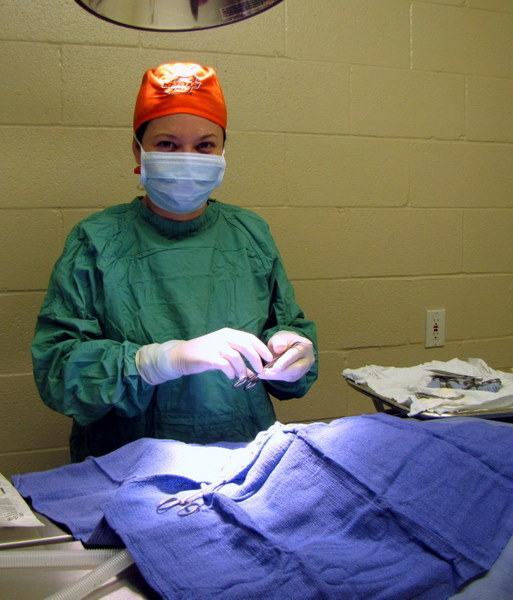|
 Many people have questions about various aspects of their pet's surgery, and we hope this information will help. It also explains the decisions you will need to make before your pet's upcoming surgery. For more information and pictures, see this page. Many people have questions about various aspects of their pet's surgery, and we hope this information will help. It also explains the decisions you will need to make before your pet's upcoming surgery. For more information and pictures, see this page.
Is the anesthetic safe?
Today's modern anesthetic monitors have made surgery much safer than in the past. Here at Sewell Animal Hospital, we do a thorough physical exam on your pet before administering anesthetics, to ensure that a fever or other illness won't be a problem. We also adjust the anesthetic protocol used depending on the health of your pet.
Preanesthetic blood testing is important in reducing the risk of anesthesia. Ideally, every pet needs blood testing before surgery to ensure that the liver and kidneys can handle the anesthetic. Even apparently healthy animals can have serious organ system problems that cannot be detected without blood testing. If there is a problem, it is much better to find it before it causes anesthetic or surgical complications.
We offer three levels of in-house blood testing before surgery, which we will go over with you when you bring your pet in. Dr. Sewell prefers the more comprehensive screen, because it gives her the most information to ensure the safety of your pet.
It is important that surgery be done on an empty stomach to reduce the risk of vomiting during and after anesthesia. The concern relates to an associated risk of aspiration pneumonia. To greatly reduce this risk we require animal be fasted starting at 10PM on Monday night (the night before surgery). Water can be left down for the pet until the morning of surgery.
Will my pet have stitches?
The incision can be closed with either absorbable sutures underneath the skin or the traditional skin stitches. If you have a personal preference, please let Dr. Sewell or the staff know. For some procedures, however, there may not be an option. With either type of suture, you will need to keep an eye on the incision for swelling or discharge. Most dogs and cats do not lick excessively or chew at the incision, but this is an occasional problem you will also need to watch for. If there are skin sutures, these will usually be removed 10 to 14 days after surgery. You will also need to limit your pet's activity level for a time and no baths are allowed until the sutures are removed.
Will my pet be in pain?
Anything that causes pain in people can be expected to cause pain in animals. Pets may not show the same symptoms of pain as people do; they usually don't whine or cry, but you can be sure they feel it. Pain medications needed will depend on the surgery performed. Major procedures require more pain relief than things like minor lacerations.
For dogs, we may recommend an oral anti-inflammatory the day after surgery and several days after to lessen the risk of discomfort and swelling. We use newer medications, which are less likely to cause stomach upset and can be given even the morning of surgery. The cost of the medication ranges from $8 to $15, depending on the size of your dog.
Because cats do not tolerate standard pain medications such as aspirin, ibuprofen, or Tylenol, we are limited in what we can give them. However, recent advances in pain medications have allowed for better pain control in cats than ever before. Our regular protocol includes a combination of injectable and oral medications.
What other decisions do I need to make?
While your pet is under anesthesia, it is the ideal time to perform other minor procedures, such as dentistry, ear cleaning, or implanting a ResQ microchip. If you would like an estimate for these extra services, please call ahead of time. This is especially important if the person dropping the pet off for surgery is not the primary decision maker for the pet's care.
What else should I know?
For most surgeries, we like to keep your pet the night following the procedure. This allows us to monitor their recovery longer and to ensure adequate pain control. Surgical patients can either be dropped off the night before the procedure or by 8:30 AM the morning of the procedure.
What communication can I expect from Sewell Animal Hospital?
We will call you the night before your scheduled surgery appointment, to confirm the time you will be dropping your pet off and to answer any questions you might have. In the meantime, please don't hesitate to call us with any questions about your pet's health or surgery.
We will also call you after your pet is awake following the procedure. At this time, we will confirm the date and time we will discharge them.
When do you regularly preform surgeries?
Tuesdays are our scheduled surgery days. This allows us to devote our attention to the surgery cases without other distractions.
|